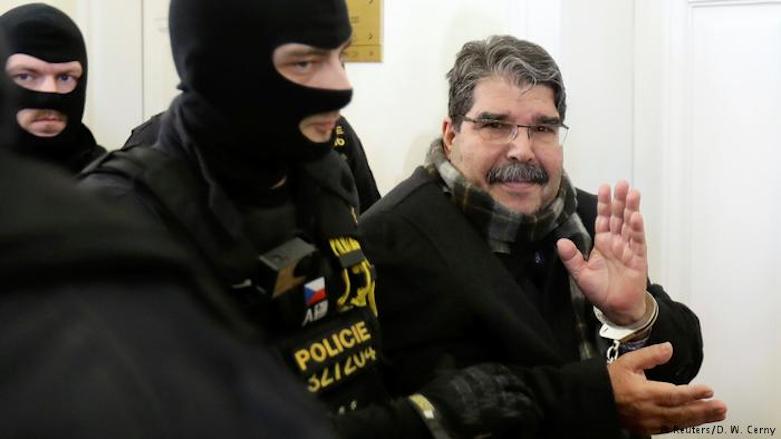Turkey enraged over Czech release of Syrian Kurdish leader

ERBIL, Kurdistan Region (Kurdistan 24) – Turkish government officials on Tuesday expressed strong discontent with Czech authorities for releasing Syrian Kurdish leader Salih Muslim whose extradition they had requested after his detention by Prague police over the weekend.
“We will not give up going after him. There is no peace to him,” Foreign Minister Mevlut Cavusoglu vowed.
Deputy Prime Minister Bekir Bozdag threatened that the decision by a Czech court to set Muslim free on bail would affect bilateral relations between the two NATO countries.
“This decision is a clear support to terrorism. It is a political decision that cannot be explained in terms of law. This decision supports terror acts against Turkey,” Bozdag told reporters in Ankara, adding he was not surprised.
President Recep Tayyip Erdogan had earlier hoped that Prague would extradite Muslim, a Syrian citizen with a residence permit in Finland.
There was no reaction from Erdogan or his Prime Minister Binali Yildirim on Muslim’s freedom at the time of publishing this report.

Czech officials have made clear that the Turkish extradition request for the former Co-leader of Syrian Kurdistan’s ruling Democratic Union Party (PYD) is still active, and additional court proceedings were expected.
A statement on Turkey’s Foreign Ministry said the Czech ruling to release him did not comply with Prague’s “obligations under international law to combat terrorism.”
The Kurdish leader, whose party’s armed wing the People’s Protection Units (YPG)—allied with the US-led coalition—defeated the Islamic State (IS) on multiple fronts in Syria, was taken into custody at Ankara’s behest.
The Turks accused European counties of being insincere and using an “unconvincing discourse on counter-terrorism.”
Justice Minister Abdulhamit Gul urged the Czech Republic to correct “its mistake of releasing Muslim.”
“The decision of Czech jurisdiction came out as against [international] conventions and laws,” Gul said, according to state media.
Ankara charges Muslim with “disrupting the unity and territorial integrity of the Turkish state, homicide, attempted homicide, damaging public property, and transporting hazardous substances.”
Turkish officials, including the former PM Ahmet Davutoglu, had hosted him during official trips to Istanbul and Ankara before mid-2015 to discuss the war in Syria and Kurdish demands there.
“In [Turkey’s] view, every Kurd who demands his rights is a terrorist,” Muslim had said in a late 2016 interview with Kurdistan 24, in which he claimed nobody would take Turkey’s arrest warrants for him seriously.
His being handcuffed and escorted by heavily armed, masked Czech police officers to the court in images news agencies wired led to an outcry from some Kurds on social media.
“Excuse me, what sort of stupidity is this?” A resident Kurdish scholar at Israel’s Tel Aviv University, Ceng Sagnic, asked.
Excuse me, what sort of a stupidity is this? pic.twitter.com/XtMpOV6Mao
— Ceng Sagnic (@cngsgnc) February 27, 2018
“You gave a son in the war against [IS], you fight for equality for all, you’re targeted for being a Kurd, yet you remain noble and forgiving. Keep killing them with your kindness, let the world know why you make them tremble so much in fear,” commented a Kurdistan Region-based user, Raz Xaidan.
You gave a son in the war against ISIS, you fight for equality for all, you’re targeted for being a Kurd, yet you remain noble and forgiving. Keep killing them with your kindness, let the world know why you make them tremble so much in fear. #SalihMuslim #EU #Syria https://t.co/SHmOxRfzwy
— Raz Xaidan (@TheDarlingBeast) February 27, 2018
“This is outrageous. Lose your son in fighting [IS] and only to be treated by Europe like this,” Yerevan Saeed, a Kurdish Ph.D. student in the US, said.
This is outrageous. Lose your son in fighting ISIS and only to be treated by Europe like this. https://t.co/3hBn0OHFWN
— Yerevan Saeed (@YerevanSaeed) February 27, 2018
Editing by Karzan Sulaivany
